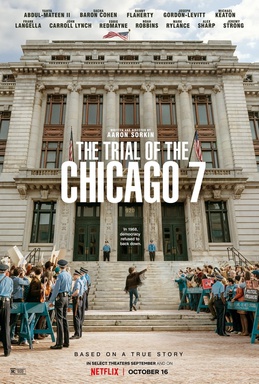“The Trial of the Chicago 7” is all too similar to current events
December 1, 2020
The parallels of past and present were already obvious when Aaron Sorkin began filming “The Trial of the Chicago 7” in the fall of 2019, but unless Sorkin is a full-blown clairvoyant, I don’t think anyone would predict how much deeper the similarities would go between wrap and release. Jump to the civil unrest of this past summer and it’s borderline eerie.
The movie follows the trial of seven interconnected activists that organized thousands of protesters across the country to descend upon Chicago for the 1968 Democratic National Convention. Their aim was united – to bring an end to the Vietnam war – though their means and personalities were heterogeneous.
They were composed of the cross section of ’60s protest culture: anti-establishment hippies, progressive intellectuals shaped by the Kennedys, Black Panthers and a staunch pacifist, Boy Scout leader who had 15-20 years of age on the rest of the gang. Representing this passionate group were their tireless lawyers, Willian Kunstler and Leonard Weinglass.
The group was being prosecuted under the newly created Anti-Riot Act on charges of attempting to incite violence, with several of them being additionally charged for crossing state lines to do such. These rogue crossers of state lines were referred to as “outside agitators.” Sound familiar? Drop this diverse group of “agitators” into a courtroom with a stodgy, old judge presiding and things are bound to get hectic — as they did for nearly 5 months.
Just as the trial is beginning, the unlikely hero, Abbie Hoffman (Sacha Baron Cohen), makes an offhand comment to Kunstler (Mark Rylance) that this is neither a civil or criminal trial, but “a political trial.” Kunstler tells him there’s no such thing as a “political trial,” to which Hoffman just smirks and disagrees. This foreshadowing frames the rest of the story and brings it uncomfortably close to our current political and legal climate. I can hardly type the words “no such thing as a political trial,” without experiencing Hoffman’s smirk evolve into sad, head-shaking laughter.
Sorkin embarked on writing and directing “The Trial of the Chicago 7” immediately following his smash hit adaptation of “To Kill A Mockingbird” on Broadway, so the famously quick-witted, fast-talking writer was freshly steeped in one of his favorite settings: the courtroom.
As much as I love a well-paced movie I can watch in one sitting, I thought a story with this many moving parts would have been better served over 3-5 episodes. Each of these characters is rich and while Sorkin did his usual top-notch job of skillfully pitting them against each other, I felt more backstory could have been excavated, especially considering the all-star cast.
As the story enters the third act, it becomes clear that this was a political trial on an even larger scale than the audience first believes. Reliable testimony suggests that it was ultimately a way for the newly elected Nixon administration to retaliate against the previous Johnson administration.
As the credits rolled, I was reminded of a comment by an old teacher of mine who suggested that it was the Nixon administration that really started eroding the trust of the American people. Could there be a string tied from the actions of the Nixon Attorney General John Mitchell (John Doman) to the seemingly endless political posturing by the current attorney general, William Barr? Of course Mitchell wasn’t the first appointed bad actor in American politics, but did he start walking in the direction that Barr is now sprinting? Hopefully, 50 years from now there’s a future Sorkin to help make sense of the events of 2020. That, for sure, will need to be a mini-series if not a multi-season endeavor.
